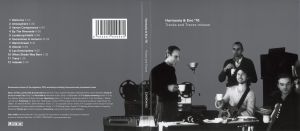
- Format: FLAC

Harmonia & Eno '76 - Tracks and Traces reissue (2009)
XLD Rip | Flac (Tracks-12) Cue, Log, m3u, md5, st5, ffp | complete Artwork 300 dpi | 405 MB
Electronic | Krautrock | 2009 | Grönland Records | CDGRON 102
Tracks and Traces is the one and only album credited to Harmonia '76, but it is generally regarded as the third album by the highly influential Krautrock/Kosmische Musik group Harmonia. Harmonia was formed by the addition of Neu! guitarist Michael Rother to Cluster, the duo of Hans-Joachim Roedelius and Dieter Moebius.
The recording sessions which resulted in this album took place in September, 1976, hence the name.
Tracks and Traces was recorded at Harmonia's studio in Forst, Germany.
Various websites quote Eno as saying that Harmonia was "the world's most important rock band" in the mid '70s, including Sherman Wick in his review of Musik Von Harmonia, the first Harmonia album. Daniel Dumych, who also cites that quote, writes in his article for hyperreal.org: "Perhaps Eno's reason for praising Harmonia so highly was that their music fit the requirements of ambient rock. Its music was equally suitable for active or passive listening. The careful listener found his/her attentions rewarded by the musical activities and sounds, but Harmonia's music was also capable of setting a sonic environment." Clearly Eno had been very impressed with both Musik Von Harmonia and Cluster's fourth album Zuckerzeit and had joined Harmonia on tour, first playing with the group at The Fabrik in Hamburg.
Jeff Melton, who reviewed Tracks and Traces for the Expose Progressive Music website, described the album, in part:
"Overall the album is relaxing and evokes dream like images but doesn't force you to passively count sheep. For a lost project which had been unreleased for over twenty years, I'd say it's as current [as] any techno project if only for the strength of the collaboration and the blurring of egos."
The album has only one vocal track, "Luneburg Heath". Jess Barnett, writing in her review for FensePost, comments that the song "has a strong Eno presence and a disembodied voice singing, 'Don’t get lost on Luneberg Heath'. The synth lines are twangy and muffled, repetitive but not boring."
Ned Raggett, writing the review for Allmusic, says in part: "Having already created two excellent albums, the core Harmonia trio was easily placed to whip up a third, with Eno the wild-card factor who turned out to be a perfect addition. While contributing some lyrics and singing at a time when he was steering away firmly from both in his own solo work, most of the time Eno lets the band speak for themselves musically, most notably adding snaky, quietly threatening basslines."
After Michael Rother left Harmonia Eno continued to work with Moebius and Roedelius, recording two albums: Cluster & Eno in 1977 and After the Heat in 1978. Harmonia also continued to influence Brian Eno's work long after its demise. A review of Musik Von Harmonia on the Cult Cargo website cites the track "Ahoi" as "the blueprint for a couple of the tracks on Eno's Apollo LP, with its minimalist picked guitar and simple piano runs."
Tracklisting
1 - Welcome 3:02
2 - Atmosphere 3:24
3 - Vamos Companeros – 4:33
4 - By The Riverside – 9:31
5 - Luneburg Heath – 4:54
6 - Sometimes In Autumn – 15:50
7 - Weird Dream – 6:41
8 - Almost – 5:29
9 - Les Demoiselles – 4:01
10 - When Shade Was Born – 1:2
11 - Trace – 1:32
12 - Aubade - 3:33
Personnel
Michael Rother – e-guitar, keyboards, drum machine
Dieter Moebius – synthesizer, mini harp
Hans-Joachim Roedelius – keyboards
Brian Eno – synthesizer, e-bass, voice, lyrics